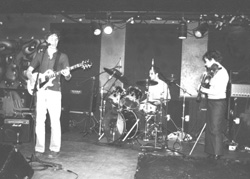

Punk, Funk and Rock: Student Music Diverse
as Ever
BY KARI WETHINGTON
 (photo by Lee Dolan) |
It’s unfortunate that campus bands are
forced to wait all semester for one 20-minute slot to shine during the
’Sco’s Campus Band Night. When their time comes around, however, you
better believe that Oberlin bands know how to live it up. This week
the ’Sco hosted two campus band nights, boasting student music that
provided a long-awaited breath of fresh air after a wearisome semester
of musical dormancy.
With hints of inspiration from bands like Galaxie 500, Big Black Car
kicked off the Tuesday night festivities with their quaint fusion of
ballady indie rock and melodic pop. Senior Nick Stillman kept the guitar
and vocal parts diverse by linking catchy guitar licks with emotional
interludes into simple melodies. Junior Amy Cimini, on viola, added
atmosphere needed to complete the sound and junior Matt Marlin added
understated rhythms that suited the sound perfectly.
With their gigantic, epidemic sound, Dead Mike made sure there was never
a dull moment during their 5-song set that concluded with a charming
cover of Green Day’s “When I Come Around.” With juniors Bryan Russell
on guitar, Greg Gheorghiu on vocals and guitar, Joe Bernache on bass
and Nima Shirazi on drums, Dead Mike definitely rocked. Dead Mike’s
sound mingled driving tempos, adventurous vocals and irresistible guitar
effects that never failed to please.
Two Heads Fallen changed the pace with tried-and-true ska while throwing
in some skanking lessons to boot. Though a small minority of the crowd
seemed ecstatic about the boisterous instrumentation, the brass-heavy
sound needed a notch or two knocked off to be reasonably listenable.
Sometimes music can be too slapdash and uninventive and Two Heads Fallen
were a shining example.
After playing numerous shows throughout the year, Freeform Technotic
was confident in their mesmerizing performance. The trio, made up of
bass, guitar and drums, provided some groovy lounge music, but pushed
the patience of the crowd with songs that were as long as a Golden Girls
rerun. There’s no doubt that the band has mastered their instruments,
but the repetitive guitar loops became less interesting as time went
on, and though the beat was danceable, it seemed a bit contrived.
Finishing off the first night of talent was Flitch, a band that saw
no comparison that night in terms of raw energy. Inviting the crowd
to mosh, the band played in a classic metal fashion, complete with intimidating
vocals and furious drums. Their sound was cohesive and from the head-bobbing
of the large crowd that had gathered by the group’s last song, it was
apparent that Flitch’s sonic intensity was well received.
The fun started all over again on Wednesday night as Bridget Matros
and her backing band delivered a well-rounded set of blues-inspired
folk tunes. Matros has an undeniably beautiful voice and comfortable
stage presence. The full instrumentation, including acoustic and electric
guitars, bass and drums, was always on the edge of being too much —
thus detracting from the startling voice. It was also disturbing that
the crowd remained seated throughout Matros’ set, a trend that unfortunately
persisted throughout the rest of Wednesday’s Campus Band Night.
Adding speed and volume to the night’s musical mix was Sodomy and Garfunkel,
the three-piece punk band/performance troupe. It was impossible not
to be amused when the band opened with their loudly amusing cover of
“The Sound of Silence.” Though the performance was fun and sassy, the
vocals were at times overwhelming (especially when the drummer added
in with harmony), no thanks to the fake British accents.
Bringing back the metal was Population Reduction, a truly terrifying
band. Even the sound check involved nebulous screaming. Between songs,
the guitarist was quite the chatter-box however, greeting the crowd
with the likes of, “Clap your hands if you like Julia Stiles, you fucking
Nazi.” It was funny in an intimidating way, but the humor meant nothing
once the last song began, and lasted even longer than the aforementioned
Golden Girls episode. It was unbearable, and though the band might have
some political message (highly doubtful) they were trying to spread,
no one in the ’Sco understood what it was.
Honey took the stage next, rocking out with a short fusion jazz set
that combined trumpet, keyboard and bass. First-year Aaliyah Bilal joined
the trio for one song; if the trio’s sound is otherwise easy to dismiss
as “background noise,” the addition of Bilal’s voice immediately wipes
out that conclusion. Though the psychadelic guitar parts and smooth
beats are satisfying on their own, without vocals the songs tend to
fade to the back of one’s attention, as evidenced by the two non-vocal
songs of Honey’s short set.
Rounding out the night was Seven Souls in Passing, a funky hip-hop group
that drew the largest crowd of the two nights, by far. Composed of trumpet,
keyboard, bass, drums, turntable and numerous vocalists/rappers, the
group’s first song had a “jazz funk flavor” that owed much to the eerie
but essential sounds of the trumpet and keyboard. Despite a few sound
system glitches, Seven S.I.P. brought the house down and proved to be
the most original band of the two-day festival.
Campus Band Night should happen more often — every month instead of
once a semester. Only then can these campus bands really expand their
audience and gain ground here in Oberlin. With a tradition of campus
bands that have been signed, there should be more institutional support
for musical creativity on campus.
![]()
"Master Harold" Meaningful, But Production Flawed
Multi-Media Pledge of Allegiance Recreated America
Punk, Funk and Rock: Student Music Diverse as Ever